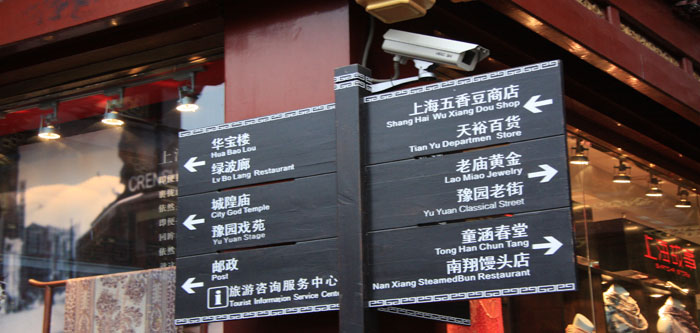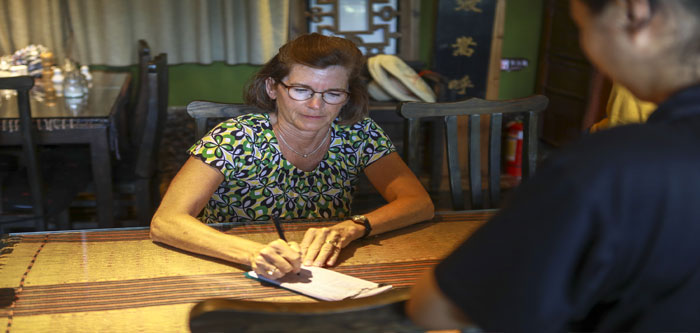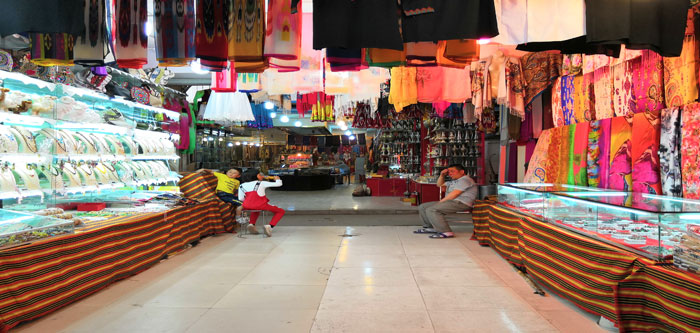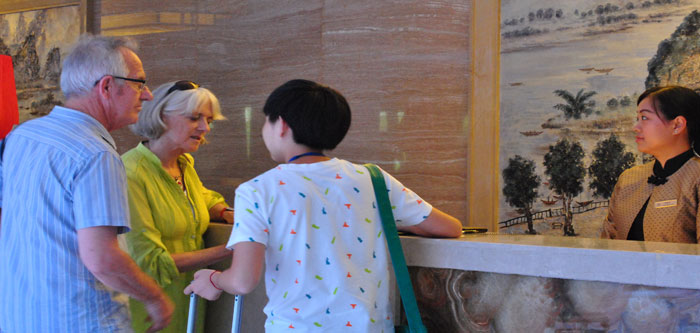The language barrier is definitely a challenge when you travel in China, especially when your cell phone doesn’t work. Learning some basic Chinese words will help you a lot. Here, we have detailed many useful Chinese words for shopping, asking directions, ordering dishes, and checking in to your hotel.
Asking Directions
- Chinese: 我想去… Wŏ xiăng qù…
English: I want to go to…
Details: Wŏ means I, xiăng means want, and qù means to go. You can add any place name at the end.
For example:
我想去机场/火车站/地铁站/故宫/银行/酒店/餐厅/厕所。
Wŏ xiăng qù jī chăng/huŏ chē zhàn/dĭ tiĕ zhàn/gù gōng/yín háng/jĭu diàn/cè suŏ.
I want to go to the airport/train station/subway station/Forbidden City/bank/hotel/restaurant/restroom.
- Chinese: 请问,你知道……在那里吗, Qĭng wèn, nĭ zhī daò … zài nă lĭ mā?
English: Excuse me, do you know where … is?
Details: Qĭng wèn means excuse — if you need to ask help from others, you should say it first; nĭ zhī daò means do you know; zài nă lĭ means where.
For example:
请问你知道机场/火车站/地铁站/故宫/银行/酒店/餐厅/厕所在哪里吗?
Qĭng wèn, nĭ zhī daò jī chăng/huŏ chē zhàn/dĭ tiĕ zhàn/gù gōng/yín háng/jĭu diàn/cè suŏ zài nă lĭ mā?
Excuse me, do you know where the airport/train station/subway station/Forbidden City/bank/hotel/restaurant/restroom is?
- Chinese: 向左/右/前/后走, Wăng zuŏ/yòu/qián/hòu zŏu
English: Turn left/right or go ahead/back.
Details: Wăng means towards, zuŏ means left, yòu means right, qián means the direction in front of you, hòu means the direction behind you.
For example:
向前走50米,遇到红绿灯右转就到了
Wăng qián zŏu 50 mĭ, yù dào hóng lǜ dēng yòu zhuăn jìu dào lē.
Walk straight for 50 meters and turn right when you encounter the traffic lights, then you have arrived.
Order Dishes at a Restaurant
- Chinese: 我要……, Wŏ yào…
English: I want…
Details: Wŏ means I and yào means want to order. You can add any dish name you want to order to at the end.
For example:
我要宫保鸡丁/北京烤鸭/糖醋排骨/牛排/饺子。
Wŏ yào gōng băo jī dīng/bĕi jīng kăo yā/táng cǜ pái gŭ/níu pái/jiăo zī.
I want to order kung pao chicken/Beijing roast duck/sweet and sour spare ribs/beef/Chinese dumplings.
- Chinese: 我不吃……, Wŏ bǜ chī…
English: I don’t eat…
Details: Wŏ means I, bǜ means don’t want, chī means eat.
For example:
我不吃肉/鸡蛋/海鲜/贝类/葱/姜/蒜/辣椒
Wŏ bù chī ròu/jī dàn/hăi xiān/bèi lèi/cōng/jiāng/suàn/là jiāo.
I don’t eat meat/eggs/seafood/shellfish/green onion/ginger/garlic/spicy food.
- Chinese: 好吃/不好吃, Hăo chī/bù hăo chī
English: Delicious or not tasty
Details: Hăo means good, chī means eat, and bǜ means not.
For example:
北京烤鸭很好吃
Bĕi jīng kăo yā hĕn hăo chī.
Beijing roast duck is very tasty.
- Chinese: 埋单, Măi dān
English: Pay the bill
Details: Măi dān — try saying this at the end of your meal.
For example:
你好,埋单
Nĭ hăo, măi dān.
Hello, I want to pay the bill.
Shopping
- Chinese: 多少钱, Duō shăo qián
English: How much
Details: Duō shăo means how many or how much, qián means the cost.
For example:
这件衣服多少钱
Zhè jiàn yī fú duō shăo qián?
How much are these clothes?
- Chinese: 这个,那个, Zhè gè, nà gè
English: This one, that one
For example: 我想要这件/那件红色的裙子
Wŏ xiăng yaò zhè jiān/ nà jiàn hóng sè dē qún zī.
I want this/that red dress.
- Chinese: 太贵了,便宜一点吧, Tài guì le, pián yí yì diăn bā
English: It’s too expensive, can we go cheaper?
Details: Tài means very, guì means expensive, pián yí means cheap, and yī diăn means a little.
For example: 这个太贵了,能便宜一点吗?
Zhè gè tài guì le, néng pián yí yì diăn mā?
This is too expensive, can we go cheaper?
- Chinese: 买/不买, Măi/bù măi
English: Buy or not buy
For example: 我要买这个
Wŏ yào măi zhè gè.
I want to buy this one.
Check in to Your Hotel
- Chinese: 我在……预定过, Wŏ zài … yù dìng guò
English: I booked the room on…
Details: yù dìng means ‘book in advance’
For example: 我是在Agoda预定的
Wŏ shì zài Agoda yù dìng dē.
I booked via Agoda.
- Chinese: 护照, Hù zhào
English: Passport
- Chinese: 一个人/两个人, Yī gè rén/liăng gè rén
English: One person or two people
Common Mandarin Chinese Words
- Chinese: 谢谢, Xièxiè English: Thank you
- Chinese: 不客气, Bù kèqì English: You’re welcome
- Chinese: 对不起, Duìbuqǐ English: I’m sorry
- Chinese: 是, Shì English: Yes
- Chinese: 不是, Bù shì English: No
- Chinese: 好, Hăo English: Good
- Chinese: 不好, Bù hăo English: Bad
- Chinese: 再见, Zàijiàn English: Goodbye




